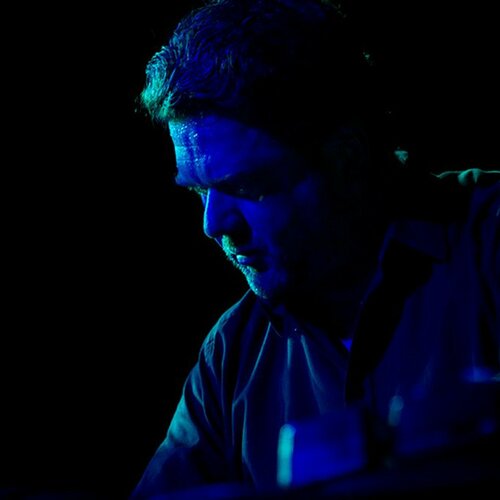Pole
country: Germany
genre: Electronic
styles: Ambient, Drone, Dub Techno, Glitch, Intelligent Dance Music, Microhouse, Minimal Techno, Sound Art
ABOUT THIS ARTIST
In 2020 the Düsseldorf-native musician, producer, remixer and mastering engineer Stefan Betke looks back on a steady 22-year career in abstract electronic club music. In particular, the seven albums that he released during this period under the Pole moniker have lastingly shifted the coordinates of electronica.
Beginning with his dark blue debut album “1” from 1998, Pole laid a foundation of bass, dub and a defective pole filter as the point from which to explore and implement new sonic architectures. Up until the turn of the millennium, these expeditions grew into a trilogy of albums entitled “1”, “2” and “3”, appearing in the colors blue, red and yellow.
The three albums are now considered milestones of electronic music and celebrate their 20th year of existence in 2020!
In 2007 pole released his album “Steingarten” on ˜scape Records followed by “Wald” in 2015. This was the first release on his on pole´s own imprint and inspired by long walks through various forests. “With previous albums, the city was that forest. Inspiration came mainly from a walk through Berlin, London or Manhattan, where I could hear or see or read something and then understand that it is possible to implement this into my work.”
On “Wald” it is manifested, for example, in raw sounds and in psychedelic structures which sound as if they might be guitars (but are actually distorted synthetic lines). The compositions “Wald” do not deny their inheritance within the continuum of Dub, yet they bring an entirely new vocabulary to Pole’s sonic and spatial universe.
“A common factor in all the releases was that they all originated in a kind of dub continuum. Melodies have never been my motivation – they were always more peripheral. But across those albums, the reverbs and the bass lines were always related and interlinked with each other. By working that way, I didn’t feel as if I was under any artificial pressure, and I could allow things to end loosely in order to continue my work.”
This very free way of working was reinforced when Stefan Betke, together with Barbara Preisinger, created the label ˜scape Records in 1999. Soon afterwards he opened his own mastering studio scape-mastering. (The previous Pole records had been released on the Hamburg label Kiff SM, and Betke worked as an engineer for CD mastering and vinyl cutting at Dubplates & Mastering in Berlin until 2000).
˜scape Records developed into a reservoir for contemporarily relevant excursions in dub, electronica and jazz. Numerous releases by Jan Jelinek, Deadbeat, Kit Clayton, Pole and many others – and not least the “Staedtizism” compilation series – continued the progressive narrative of electronic music until 2010, when Preisinger and Betke decided to bring ˜scape Records to its conclusion.
Betke continues to operate the scape studio, in which he has not only produced his own music, but also a considerable number of remixes for a diverse range of artists including Trentemøller, Appliance, Louis Armstrong, Roll The Dice, and The Orb feat. Lee Perry. In the same studio, Betke has also mastered countless tracks and albums for CD and vinyl.
The fact that over the years Pole has released on four labels – Kiff SM, ˜scape Records, Mute Records and Pole (the label) – has never harmed the consistency of those releases. Although it was with the now-legendary, defective Waldorf 4-Pole filter that Pole initially realized his signature sound, over the years Pole emerged as a sonic architect who increasingly drew from internal sources – finding inspiration in the city as well as in nature.
The urban canyons of New York or the broad avenues of Berlin, the mountains and valleys with their echoes, the meditative forests, the above, below and beyond, as well as the horizon – offset by the verticals of trees and buildings – became a sort of matrix for Pole, within which he could hone a very specific poetry of reverberation with unmatched virtuosity.
Pole increasingly presented this through live performances, in which the elements of improvisation and the erratic development of his own music played an equally constant and central role. Pole performed in small clubs and on the biggest festival stages and over the years he has built up a large international fan base. Pole: “I work on my music with patience, without paying heed to trends and fashions. I write my music outside of the timeline of electronic music.
With the precision of a structural engineer and the confident intuition of one who can hear sound where previously there was silence, Pole goes to the concrete cellars, open-air stages and nightclubs in his path and busts them open from the inside out. The fact that Steve Reich and Arnold Schoenberg, John Zorn, Arto Lindsay and Fred Frith stand alongside Jamaica and Lee Perry as important influences for the professed minimalist has so far neither hurt the energy-discharging potential of his concerts nor the stringent, reductive simplicity of his albums.
At the same time, Pole has always been open to various shorter and longer term collaborations with other musicians, such as Four Tet, Roll The Dice or the American rapper Fat Jon. In other words: Over the long period of 22 years, Pole has been able to maintain a consistently high level of concentration, not only daring to experiment, but also to release the results – for example, with the 2003 album “Pole” (Mute Records), which features the vocals of Fat Jon. For an entire album, it became evident how it can sound when the human voice and Pole’s unique echo chamber enter into a dialogue. In retrospect, this journey away from instrumental music can be viewed as a singular detour. Throughout these various collaborations, Pole has maintained a head-on approach to the discourse at hand – permanently refocusing a restless mind.
Releases
 EP
EP
Tempus Remixes
out on November 24, 2023
via Mute
 Single
Single
Stechmück (Sleaford Mods Rework)
out on October 24, 2023
via Mute
 LP
LP
Tempus
out on November 18, 2022
via Mute
 Single
Single
Tempus
out on November 02, 2022
via Mute
 Single
Single
Stechmück
out on September 28, 2022
via Mute
 Single
Single
Grauer Sand
out on August 16, 2022
via Mute
 Single
Single
Tanzboden
out on August 13, 2021
via Mute
 Single
Single
Rost
out on June 23, 2021
via Mute
 Single
Single
Fading
out on November 06, 2020
via Mute
 Single
Single
Nebelkrähe
out on October 13, 2020
via Mute
Similar Artists and Bands







